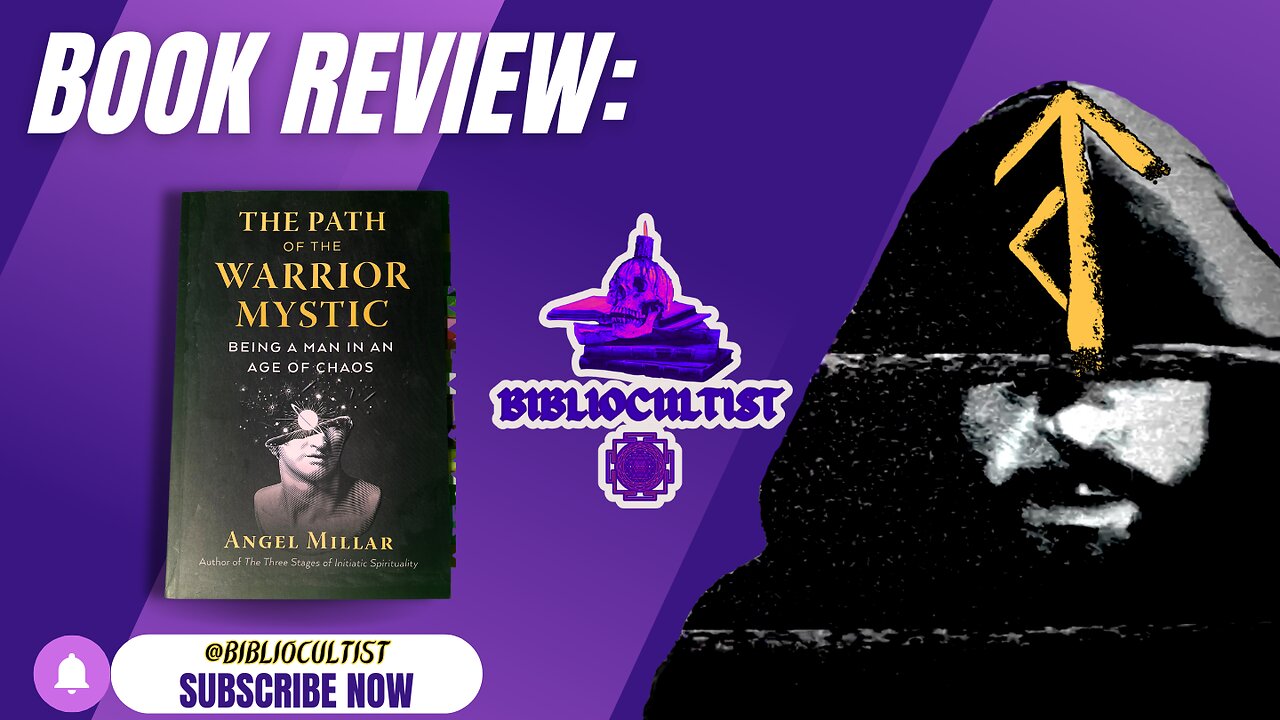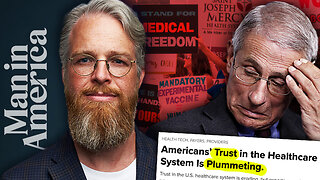Premium Only Content

The Warrior Mystic's Ancient Truth
In this 'spoiler free' #bookreview/#bookrecommendation, I examine 'The Path of the Warrior Mystic' by Angel Millar, which introduces traditionalist/perennialist concepts. The book contrasts the ancient view of an unchanging human soul/nature with the modern 'blank slate' idea. It explores the duality of the warrior archetype as both compassionate and ruthless. Millar emphasizes the importance of rituals and rules in connecting to something beyond the self. The work also discusses biological and mystical differences between men and women, a common topic in traditionalist thought.
*all music and content copyright BiblioCultist.com*
#booktube #books #angelmijar #thepathofthewarriormystic #tradition #perennialism #warriorarchetype #rituals #genderdifferences #biblio #cultist #cult
**SHOW NOTES**
1. Angel Millar is a contemporary author and lecturer known for exploring esoteric traditions, mysticism, and self-development. His works, such as *The Path of the Warrior Mystic* and *The Three Stages of Initiatic Spirituality*, blend ancient wisdom from martial arts, meditation, and esoteric philosophies with practical guidance for personal growth. Millar’s writing emphasizes discipline, inner awakening, and the integration of body, mind, and spirit, appealing to spiritual seekers and martial artists alike. He is also an expert on Freemasonry and its influence on Western esoteric thought.
2. The *Traditionalist School* is a philosophical and cultural movement that emphasizes the rejection of modernity and the restoration of timeless spiritual and metaphysical principles. Rooted in the works of thinkers like **René Guénon** and later expanded by **Julius Evola**, it critiques modern materialism, secularism, and egalitarianism, advocating instead for hierarchical, spiritual, and traditional societies. Traditionalists believe in the existence of a universal "perennial wisdom" (philosophia perennis) underlying all authentic religious traditions and seek to revive esoteric and initiatic practices as paths to higher truth. Julius Evola, in particular, added a more political and activist dimension, focusing on aristocratic values, warrior ethics, and resistance to the "decline of the West."
3. The *Sophists* were a group of Classical Greek teachers known for their relativistic philosophy, emphasizing that truth and morality are subjective and dependent on individual perspectives or societal norms. They focused on rhetoric and persuasion, often teaching practical skills for success in public life. **Platonism**, led by Plato, opposed the Sophists by advocating for objective truths and universal ideals (Forms). Plato criticized the Sophists' moral relativism, arguing that true knowledge comes from reason and transcendent principles, not manipulation or subjective opinion.
4. *Logos theology* in the ancient world referred to the concept of a divine, rational principle or order that governs the universe. Rooted in Greek philosophy (e.g., Heraclitus saw Logos as the underlying reason or order of reality), it was later adopted into Jewish and Christian thought, most notably in the Gospel of John, where Christ is identified as the Logos ("Word") incarnate, bridging God and creation. This idea unified reason, divinity, and cosmic order across traditions.
5. *Yukio Mishima* (1925–1970) was a renowned Japanese author, poet, and playwright, celebrated for his mastery of traditional Japanese aesthetics and his provocative exploration of beauty, death, and cultural identity. A staunch traditionalist, Mishima revered Japan's samurai heritage and Shinto values, often critiquing modernity's erosion of these ideals. Beyond his literary achievements, he was a controversial figure due to his radical political views and dramatic ritual suicide (*seppuku*) in 1970, following a failed coup attempt to restore imperial rule. Mishima remains an iconic yet polarizing symbol of artistic brilliance and ideological extremism.
6. The Sanskrit term "samskara" (संस्कार) refers to mental impressions or habits formed by past actions and experiences, shaping one’s character and future tendencies. It also denotes rituals or rites of passage that refine individuals for life stages. Derived from "sam" (well, complete) and "kara" (to make), its etymology conveys the idea of perfecting or refining through intentional action, whether in personal development or ceremonial practices.
-
 25:14
25:14
GritsGG
15 hours agoRank 1 Player Spectates Casual Solos!
9.41K -
 LIVE
LIVE
Lofi Girl
2 years agoSynthwave Radio 🌌 - beats to chill/game to
730 watching -
 4:33:40
4:33:40
FreshandFit
9 hours agoAfter Hours w/ Girls
235K118 -
 2:33:36
2:33:36
Badlands Media
10 hours agoOnlyLands Ep. 21: From Trump’s VP Pick to Green Energy Grift
68.3K8 -
 1:07:26
1:07:26
Inverted World Live
13 hours agoThe War Against Robots w/ Joe Allen
98.4K5 -
 6:08:31
6:08:31
SpartakusLIVE
13 hours agoWARZONE NUKE IS BACK?! || Solo Challenge CHAMPION to start, duos w/ the Dawg later
102K1 -
 1:00:18
1:00:18
Man in America
14 hours agoBig Pharma’s Empire of Lies Is COLLAPSING as People Turn to Natural Medicine
65.1K25 -
 7:17:44
7:17:44
Drew Hernandez
16 hours agoGHISLAINE MAXWELL SAYS CLAIMS EPSTEIN WAS INTELLIGENCE ASSET ARE BULLSH*T?!
38K39 -
 29:54
29:54
Afshin Rattansi's Going Underground
1 day agoUkraine: Prof. Anatol Lieven SLAMS Europe’s ‘BLOODY STUPIDITY’ as Trump Negotiates with Putin
34.7K8 -
 15:27
15:27
robbijan
1 day ago $2.47 earnedThe Emperor’s New Labubu & The Spiritual War Behind Everything
55.3K43